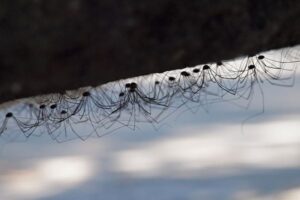RSVP HERE TO RECEIVE THE ZOOM DETAILS: https://marylandnature.wildapricot.org/event-4473551
From their common names to their bite, the arachnid order Opiliones, also known as “daddy-longlegs” or “harvestmen,” have been historically misunderstood. Opiliones are really common in eastern North America– many people have seen huge clusters of them in the eaves of sheds or outhouses in the summertime. However, Opiliones are often feared because of myths related to their resemblance to spiders. Therefore, it is important to teach the public that these organisms are not dangerous to humans at all and are in fact interesting creatures that are beneficial to have in gardens and landscapes. I will dispel common myths about the wonderfully diverse Opiliones of North America by discussing their physiology, behavior, and treatment throughout history. From this talk, participants will learn 1) Opiliones are different from spiders in many keyways, namely that Opiliones lack venom and silk, 2) Opiliones have reproductive behavior that is rare and unique among arthropods, 3) Cultures around the world view Opiliones positively.
Bio: Dr. Mercedes Burns is an assistant professor of evolutionary biology at the University of Maryland, Baltimore County. Her research focuses on the evolution of sexual reproduction and behavior, especially in arthropods.

